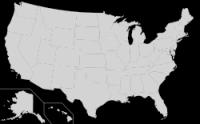Home | subdivision type | US state
|
|
|
A U.S. state (abbreviation of United States state) is any one of the 50 federated states of the United States of America that share sovereignty with the federal government. Because of this shared sovereignty, an American is a citizen both of the federal entity and of his or her state of domicile. Four states use the official title of commonwealth rather than state. State citizenship is flexible and no government approval is required to move between states (with the exception of convicts on parole). The United States Constitution allocates power between these two levels of government. By ratifying the Constitution, the people transferred certain limited sovereign powers to the federal government from their states. Under the Tenth Amendment, all powers not delegated to the federal government nor prohibited to the states are retained by the states or the people. Historically, the tasks of public safety (in the sense of controlling crime), public education, public health, transportation, and infrastructure have generally been considered primarily state responsibilities, although all of these now have significant federal funding and regulation as well (based largely upon the Commerce Clause, the Taxing and Spending Clause, and the Necessary and Proper Clause of the Constitution). Over time, the Constitution has been amended, and the interpretation and application of its provisions have changed. The general tendency has been toward centralization and incorporation, with the federal government playing a much larger role than it once did. There is a continuing debate over states' rights, which concerns the extent and nature of the states' powers and sovereignty in relation to the federal government as well as the rights of individual persons. Congress may admit new states on an equal footing with existing ones; this last happened in 1959 with the admission of Alaska and Hawaii. The Constitution is silent on the question of whether states have the power to leave unilaterally, or secede from, the Union, but the Supreme Court has ruled secession to be unconstitutional, a position driven in part by the outcome of the American Civil War. |




 RSS
RSS